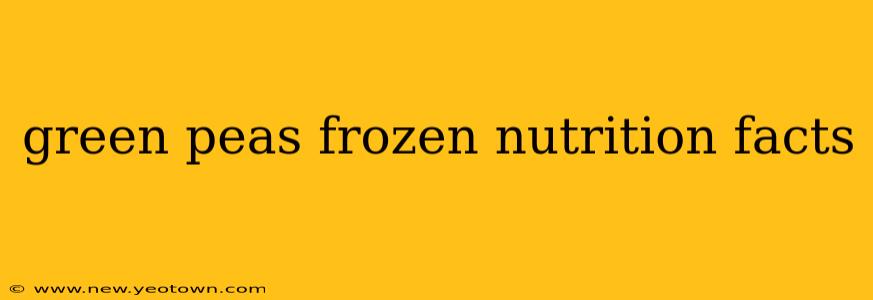Let's be honest, frozen green peas aren't the flashiest vegetable. They don't boast the vibrant colors of bell peppers or the exotic appeal of asparagus. But tucked away in your freezer, these humble little spheres hold a nutritional punch that’s anything but ordinary. This isn't just a convenient side dish; it's a nutritional powerhouse packed with vitamins, minerals, and fiber. Join me as we delve into the surprisingly impressive nutritional facts of frozen green peas.
What are the Nutritional Benefits of Frozen Green Peas?
Frozen green peas are a nutritional champion, boasting an impressive profile of vitamins, minerals, and antioxidants. They’re an excellent source of vitamin K, crucial for blood clotting and bone health. They also offer a decent dose of vitamin C, a powerful antioxidant that supports your immune system. Furthermore, they contain folate, essential for cell growth and development, particularly important during pregnancy. And let's not forget the fiber! Fiber aids digestion, keeps you feeling full, and contributes to overall gut health.
Are Frozen Green Peas as Nutritious as Fresh?
This is a question that often pops up. The truth is, frozen green peas are often just as nutritious, if not more so, than their fresh counterparts. Why? Because they're typically frozen at the peak of ripeness, locking in vital nutrients before any significant nutrient loss occurs during transportation and extended shelf life. Fresh peas, on the other hand, can lose some nutritional value during transport and storage. It's a common misconception that freezing diminishes nutrients; in the case of peas, it actually helps preserve them.
How Many Calories are in Frozen Green Peas?
A one-cup serving of frozen green peas typically contains around 62 calories. This low calorie count makes them a fantastic addition to a weight-management diet. They are also relatively low in fat and sodium, making them a heart-healthy choice.
What Vitamins and Minerals are in Frozen Green Peas?
Let's break down the vitamin and mineral powerhouse within:
- Vitamin K: Essential for blood clotting and bone health.
- Vitamin C: A potent antioxidant boosting immunity.
- Folate (Vitamin B9): Crucial for cell growth and development.
- Vitamin A: Supports vision and immune function.
- Manganese: Important for bone health and metabolism.
- Iron: Essential for red blood cell production.
- Potassium: Helps regulate blood pressure.
- Fiber: Promotes digestive health and satiety.
Are Frozen Peas Good for Weight Loss?
Absolutely! Their low calorie count, high fiber content, and satiating nature make them ideal for weight management. The fiber helps you feel full, preventing overeating, while the low calorie density allows you to enjoy a larger volume of food without exceeding your daily caloric intake.
How to Incorporate Frozen Green Peas into Your Diet?
The versatility of frozen peas is remarkable! They can be added to soups, stews, and casseroles for a nutritional boost. Puree them into a vibrant green sauce or add them to stir-fries for a burst of freshness. They're delicious simply steamed and seasoned, or as a side dish alongside your favorite protein.
Conclusion: The Unsung Hero of Your Freezer
Frozen green peas are more than just a convenient pantry staple. They are a nutritional gem, packed with essential vitamins, minerals, and fiber. Their affordability, convenience, and impressive nutritional profile make them a staple in any healthy diet. So next time you're stocking your freezer, don't overlook these little green powerhouses. They're waiting to add a healthy and delicious boost to your meals.

